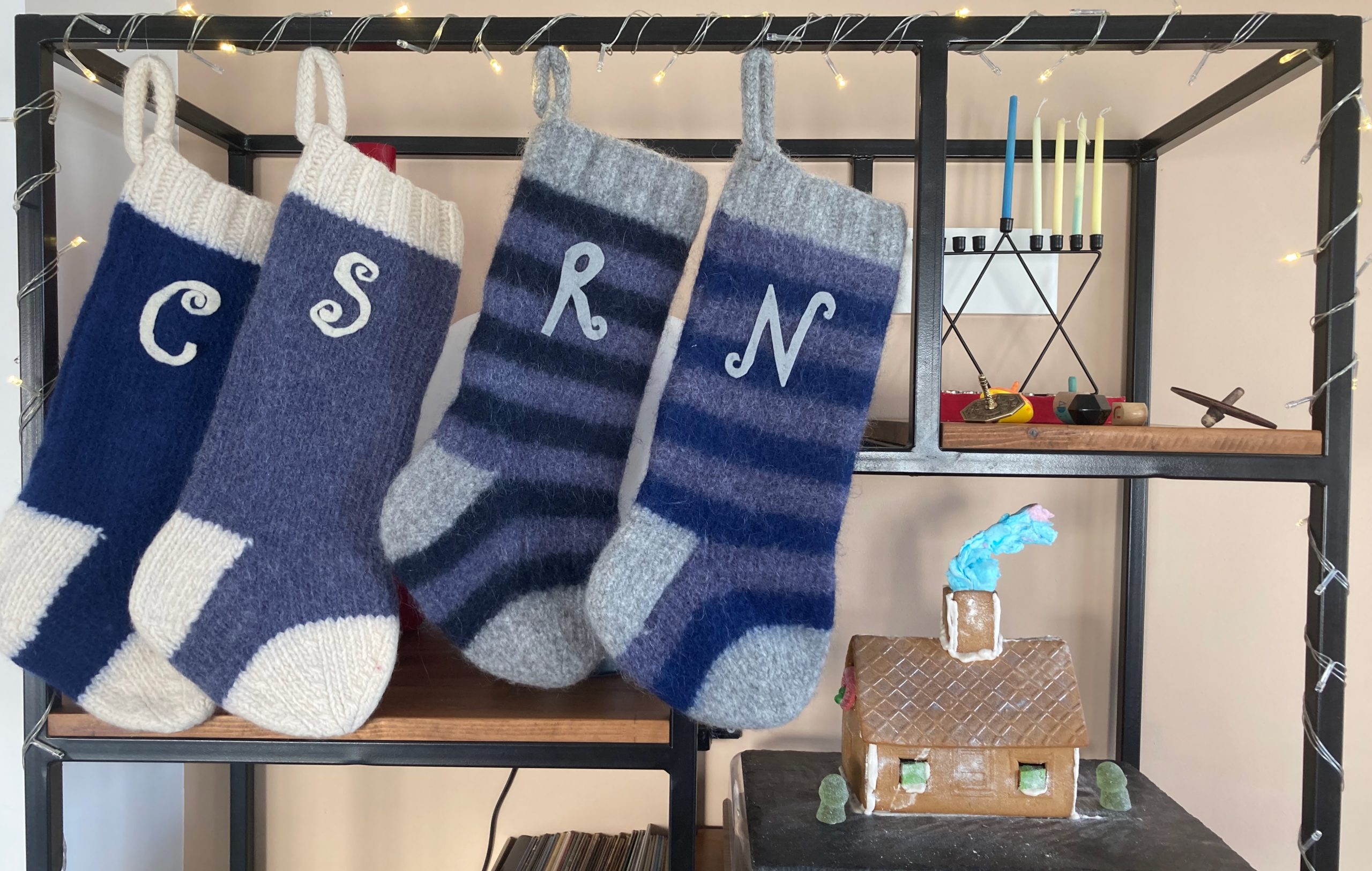Antiochus, Santa and My Son
December Reflections from an Interfaith Home
Carl Yonker

Driving through Tel Aviv on a cool December day in 2018, my then almost-three-year-old son gave us his take on Hanukkah and Christmas.
Asked about Antiochus, he replied that Antiochus killed the Jews and hated them. Shifting gears, my wife asked our son whose birthday was coming up? He replied, “Santa’s!” And what do we sing to Santa? "Happy Christmas, Santa!"
Such is life in an interfaith home where Hannukah and Christmas decorations share space, and making levivot (latkes) and eating sufganiyot take place alongside baking gingerbread cookies and building gingerbread houses. A conversation about the Maccabees with my son quickly turns to questions about Santa and expressions of concern over whether Santa will still deliver his gifts if we are away on vacation for Christmas.
The two holidays are not blended into “Chrismukkah” but coexist side by side, reflecting our shared respect and affection for the religious and cultural traditions in which my wife and I were raised: her’s as an Israeli Jew and mine as an American Christian. Moreover, it recognizes our shared identity as a family and the existence of these two identities in our boys.
Growing up in a Colorado town with a small Jewish community, I was largely unaware of Hanukkah as it was not common for a menorah to be publicly displayed alongside a Christmas tree.
This changed in the last two decades as the local Jewish community grew and Christmas displays transformed into shared winter displays of the religious symbols of both holidays.
This sharing of the public space reflects a broader cultural transformation in America that aims to better acknowledge and honor the diverse religious traditions of Americans.
For American Jews, in particular, Hannukah is no longer a minor holiday but one that holds greater significance than it is typically accorded within Judaism. As scholar Jonathan Sarna observed, this was primarily a result of Christmas gaining greater significance in American life in the 19th century, eventually becoming a national holiday.
It was hoped that Hanukkah would compete with Christmas by providing an attractive alternative or at least provide Jewish children a feeling that they were not left behind as their Christian friends received gifts.
Indeed, Hannukah is a marker of Jewish identity and life in the United States and reflects the efforts of American Jews to navigate living as a religious minority.
In Israel, this situation is reversed. For Israeli Jews, a majority, Hannukah remains a minor holiday largely devoid of religious meaning. It is, instead, a national one that does not even seek to compete with Christmas, the holiday of only a small minority of the state’s citizens.
The extent to which Hanukkah has been commercialized has little to do with exchanging and giving gifts and more with the promotion of activities for children to fill up a weeklong vacation from school and eating tasty desserts.
While Christmas has become more visible in the Israeli public, it is largely stripped of its religious meaning, and there is no effort to make it a national holiday on par with Hannukah.
As an American Christian in Israel, my role is reversed as well. I am forced to confront the reality of living as a religious minority in the Jewish state, a fact that transforms the meaning of Christmas for me: it serves as a marker of identity – religiously and culturally – in a way it previously did not.
Regardless of the holiday’s religious significance or my own level of religious observance, Christmas holds a special place in my heart, connecting me to my family and our holiday traditions, many of which originated in Denmark and Germany.
I will always fondly remember receiving and opening my Advent calendar, baking traditional cookies like gingerbread and springerle, enjoying dinner on Christmas Eve, and unwrapping presents at my grandparents’ house.
And nothing brings me greater joy than seeing the same excitement in my son as he rushes every morning to open his Lego Star Wars Advent calendar, bakes gingerbread cookies with my parents, builds his first gingerbread house, and writes letters to Santa for him and his baby brother.
While Christmas holds a special place in my family, I recognize it does not for all. Moreover, I would be remiss if I failed to acknowledge the long, painful history of Christian antisemitism and Christmas serving as a date for perpetrating heinous, hateful acts against Jews.
My wife and I are well-aware of the weight of this history and, in time, our children will be made aware of it as well. Doing so will be complicated as they figure out how to navigate the different aspects of their identity.
Moreover, it is important that Hanukkah and Christmas remain distinct from each other. They are, after all, different holidays with separate messages regardless of what a Fox News host might claim.
The irony, of course, is that the message of Hannukah is one of anti-assimilation. The Maccabees would undoubtedly disapprove of our family’s observance of both holidays (to say nothing about our marriage). However, to negate either of these aspects of our family’s identity would not only be unfair, but deprive us of traditions that give us meaning and connect us to our loved ones.
